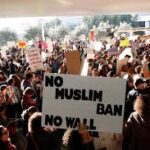[A slightly modified version of this op-ed first appeared in The Gazette, the student newspaper at Western University in London, Ontario.]
In June 1967, during the Six-Day War, Israel began its occupation of the West Bank and East Jerusalem. Less than six months later, the U.N. Security Council adopted Resolution 242. Resolution 242 invoked the foundational international legal principle of the “inadmissibility of the acquisition of territory by war” and called for “withdrawal of Israeli armed forces from territories occupied in the recent conflict.”
Almost 50 years later, the occupation grinds on. Most Palestinians living in the West Bank and East Jerusalem have spent their entire lives under the jackboot of Israeli military oppression.
Not only has Israel’s brutal occupation endured for half a century, but throughout that time, Israel has forcibly confiscated more and more occupied territory to make way for Jewish-only settlements. In 2004, the International Court of Justice unanimously ruled (with the concurrence of the United States judge) that Israel’s settlements violate article 49 of the Fourth Geneva Convention. Article 49 states “Individual or mass forcible transfers, as well as deportations of protected persons from occupied territory to the territory of the Occupying Power or to that of any other country, occupied or not, are prohibited, regardless of their motive.”
The international community has repeatedly condemned Israel’s settlements. The most recent example is U.N. Security Council Resolution 2334, adopted in December 2016 by a vote of 14-0. Resolution 2334 “reaffirms that the establishment by Israel of settlements in the Palestinian territory occupied since 1967, including East Jerusalem, has no legal validity and constitutes a flagrant violation under international law and a major obstacle to the achievement of the two-State solution and a just, lasting and comprehensive peace.” Consistently with Resolution 2334, Canada’s government acknowledges on its Global Affairs website that the settlements violate the Fourth Geneva Convention and constitute a “serious obstacle to achieving a comprehensive, just and lasting peace.”
On February 6, 2017, Israel’s Knesset responded to Security Council Resolution 2334 with an act of supreme chutzpah: it passed a ‘Settlement Regulation’ Law which purported to legalize retroactively dozens of wildcat settlements.
Israel’s violations of international law are by no means limited to its ever-expanding settlements and its endless occupation. Internationally renowned human rights organizations, including Amnesty International, Human Rights Watch, and the Israeli human rights organization B’Tselem, have long documented Israel’s torture – including the torture of children, its use of collective punishment (another violation of the Fourth Geneva Convention), its indefinite detention without due process of peaceful Palestinian dissenters, and its ‘extrajudicial assassinations’ (a euphemism for murder).
How has Israel gotten away with these crimes for so long? The answer is simple enough: a law that is never enforced is a dead letter. Although the international community has repeatedly condemned Israel’s human rights abuses, Western governments have shielded Israel from any meaningful sanctions, and have accorded to it a privileged status. Indeed, in 2016, the Obama administration granted Israel, a wealthy state possessing the Middle East’s only nuclear arsenal, the largest military aid package in United States history.
In response to Israeli impunity during decades of lawlessness, over 170 Palestinian citizens’ organizations have called for the use of boycott, divestment and sanctions, or “BDS”. The BDS movement is a peaceful, anti-racist movement modelled on the boycott movement that helped to bring an end to South African apartheid. Yet Western governments, anxious to perpetuate Israel’s impunity, have sought to demonize the BDS movement. Recently, Conservative and Liberal MPs and MPPs voted to condemn the BDS movement in Canada’s Parliament and Ontario’s legislature.
But Canadians aren’t buying it. This year, a new poll conducted by EKOS Research Associates shows that 78% of those who expressed an opinion believe that a boycott is a reasonable measure to ensure Israel’s respect for international law. Sixty-six percent of those who expressed an opinion said that Canadian government sanctions on Israel would also be a reasonable deterrence measure. The EKOS poll showed that most Canadians oppose Parliament’s condemnation of the boycott movement, while only 26% support it.
It is in this context that students of King’s College have brought forward a resolution supportive of the boycott campaign. King’s students will vote on that resolution on March 13 and 14. In advance of the vote, Israel’s apologists on Western’s campus have sought to misrepresent the nature of the BDS movement. They falsely conflate the state of Israel with all Jews, and assert that boycotting companies that are complicit in violations of Palestinian human rights is tantamount to persecution of the Jewish people.
But this claim conveniently ignores that that the boycott movement does not target the Jewish people, and never has. On the contrary, it targets – peacefully – human rights violators. Indeed, the BDS movement is supported by many Jewish intellectuals, and by rapidly growing Jewish organizations that advocate for Palestinian rights, including Naomi Klein, Noam Chomsky, Independent Jewish Voices Canada, and Jewish Voice for Peace. More and more, members of the Jewish community declare that the government of Israel does not speak for them, and that its inhumane oppression of the Palestinian people is an affront to Jewish values.
Indeed, Israel’s regime of occupation and dispossession is an affront to our most basic sense of human decency. By supporting a boycott of those who profit from that regime, the students of King’s would do nothing more – and nothing less – than stand up for human decency.





